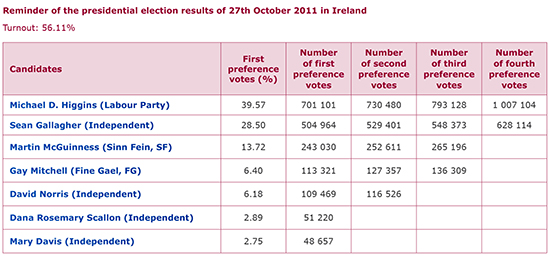Analysis
Elections in Europe
Corinne Deloy
-

Available versions :
EN

Corinne Deloy
On 28th August last, Eoghan Murphy, (Fine Gael, FG) Minister for Housing, Planning and Local Government announced to the Irish that they would be convened to ballot on 26th October next to elect the President of the Republic.
A month and a half prior to this, on 10th July, outgoing head of State, Michael D Higgins announced that he intended to run for office again, even though in 2011 he said he would only stay for one mandate.
For the first time since 1966, an outgoing President of the Republic has rivals to face and will therefore not be re-elected automatically, without an electoral battle, as has been the case for several of his predecessors. Michael D Higgins is supported by the Labour Party to which he belongs, Leo Varadkar, and the Taoiseach's (Prime Minister in Gaelic) Fine Gael, and Fianna Fail (FF). Many political parties in the Celtic Republic do not want to engage an expensive electoral campaign and have chosen not to put any candidates forward in the presidential election on 26th October.
Extremely popular, the outgoing head of State has succeeded in supporting his fellow countrymen over the last seven years as they have witnessed great changes in Ireland (acceptance via referendum of same-sex marriage on 22nd May 2015 and of the liberalisation of abortion on 25th May 2018). In 2014 he was the first President of the Republic to undertake a State visit to the UK.
The candidates running
Michael D Higgins will be running against five others:
– Gavin Duffy, 58, independent, originally from Meath, a businessman. He took part in Dragons' Den, a telereality show on RTE;
– Peter Casey, 60, independent, originally from Derry, founder and General Manager of the global recruitment company, Claddagh Resources and also known for his role in Dragons' Den;
– Joan Freeman, independent, originally from Dublin, a psychologist. A Senator, she founded the Maison Pieta, an organisation that aims to prevent suicide; in 2006 she took over its management until 2014;
– Sean Gallagher, independent, originally from Monaghan, a businessman and unfortunate candidate in the last presidential election on 27th October 2011. He came second, winning 28.5% of the first preference votes (39.6% for Michael Higgins). He also took part in Dragons' Den;
– Liadh Ni Riada, 51, MP and Sinn Fein (SF) candidate, a radical, nationalist left wing party. Former TV producer, she was appointed on 16th September last by the Ard Comhairle (the party's High Council).
Sinn Fein maintains that taking part in the election is good for the country and democracy. It will use the electoral campaign to highlight the need for Irish reunification and the role of women in the national debate. "People in Ireland want political and social change," declared Mary Lou McDonald, the party's leader.
The Presidential Function
The President of the Republic of Ireland is elected by the so-called alternative vote for a 7 year mandate that is renewable once. The post is accessible to any Irish citizen who is aged at least 35. All candidates to the supreme office have to have won the signature of a minimum of 20 members of the Oireachtas (Parliament) or the support of at least 4 County Councils or 4 Town Councils. The former Heads of State (or the outgoing President of the Republic) are the only ones exempt from this obligation. They can therefore stand-alone before the electorate, as outgoing head of State, Michael D Higgins is doing.
Although the President of the Republic only plays a representative role in Ireland, he can however refer a draft bill to the Supreme Court, if he deems it unconstitutional and refuse to dissolve the Dail Eireann (House of Representatives), the lower house of parliament. Indeed according to the Constitution, the Taoiseach must resign if he loses the support of his parliamentary majority. He can however ask the Head of State to dissolve the House of Representatives. The latter is then allowed to refuse this request, in which case the Prime Minister is obliged to resign.
The most recent poll by RED C, published in The Sunday Business Post on 16th last forecasts an easy victory for outgoing President Higgins in the election with 67% of the vote. Sean Gallagher is due to come 2nd with 15% of the vote, ahead of Sinn Fein candidate, Liadh Ni Riada, who is due to take 7% of the vote and Gavin Duffy with 6%.
The President of the Republic elected on 26th October will officially take office on 11th November next as he enters the Aras an Uachtarain (name of the residence of the Irish heads of State).
On the same day as the presidential election, the Irish will be called to vote by referendum on the removal of the offence of the publication or declaration of blasphemy from the Constitution. In order to be completely adopted this amendment to the Fundamental Law must be put to the Dail Eireann, adopted by the two houses of Parliament and approved by referendum. Blasphemy is punishable by a fine of 25,000€ in Ireland.
On the same theme
To go further
Elections in Europe
Corinne Deloy
—
15 April 2025
Elections in Europe
Corinne Deloy
—
25 February 2025
Elections in Europe
Corinne Deloy
—
18 February 2025
Elections in Europe
Corinne Deloy
—
28 January 2025

The Letter
Schuman
European news of the week
Unique in its genre, with its 200,000 subscribers and its editions in 6 languages (French, English, German, Spanish, Polish and Ukrainian), it has brought to you, for 15 years, a summary of European news, more needed now than ever
Versions :




